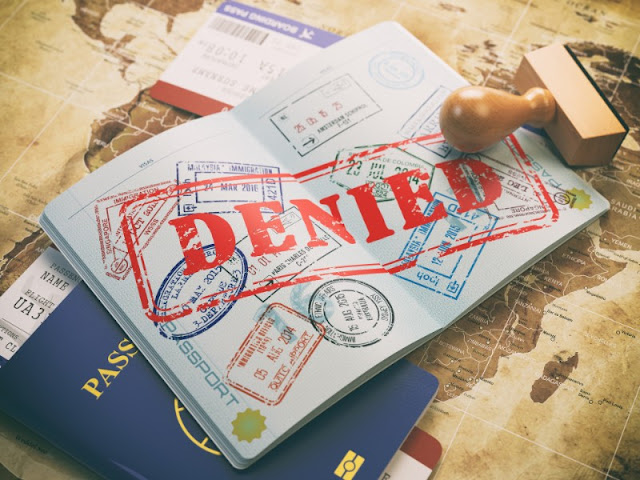There is no bigger dejection than a visa rejection when you are all set to travel to a new country. The news of your visa application getting rejected can break your travel plans and dampen your mood, especially if you are traveling to the country for a holiday. It becomes a bigger problem if you have to travel for work or studies. Visa applications are usually lengthy and time-consuming. With long application forms to fill out and an array of documents to submit, it is easy to make a mistake. But knowing about the common reasons for visa rejection will help you avoid making them. Here we have listed some of the most common reasons for travel visa denial.
Incomplete Application Form with Incorrect Details
Every visa application begins with filling in an application form. It is mandatory to fill in the form completely and correctly. If you fail to do so, your visa application is likely to get rejected. All the blanks in the application have to be filled. Most application forms have guidelines to help if you get stuck somewhere. Apart from this, providing wrong information can also lead to rejection. If the information in the form does not match the supporting documents, your visa application will not be approved. This includes spelling errors as well.
Invalid passport
Another common reason for visa rejection is submitting a passport with no validity. You cannot submit a passport that has surpassed its date of expiry. Apart from this, you must also check the passport validity requirements of the country you plan to visit. For instance, as per
Dubai visa requirements, your passport should have a minimum validity of six months from the date of returning from the city. If this is not fulfilled, your application may get rejected. Moreover, you may face rejection if there are no blank pages in your passport. Most countries require passports with at least two blank pages for visa stamping.
Incomplete Documentation
Along with the application form and passport, you must submit a list of documents while submitting the visa application form. If you miss any of these documents, the chance of visa approval is minimal. Moreover, you must refrain from submitting fake documents as well. If the application form is submitted along with fake documents, your visa application may not be approved. Besides these, you must also follow all the rules laid down by the embassy or the consulate of the country you want to visit.
Unclear Intent of Travel
The reason for rejection is often simple: the applicant cannot describe the reason for traveling to a country. It is imperative to state the reason for visiting a country. For instance, if you are traveling to the USA for a course, you must submit the approval letter received from the university. Similarly, if you want to travel to a country for a conference or meeting, you must present an invitation letter from the host company.
Unclear Intent of Return
Just like you must provide a specific reason and proof of visiting a foreign country, you also must make your intention of returning to your home country clear while applying for a visa. You must convince the visa officer that you intend to return to your country once the visa expires. You must submit proof of your job, family relations, or even property for this. You must also mention the specific date you plan to return and submit the confirmed return flight ticket as proof. You must do so to avoid getting a rejection.
Incomplete or Missing Travel Itinerary
Most embassies or consulates expect you to plan your travel itinerary before you apply for a visa. You will likely face a visa application rejection if the documentation does not include your itinerary. While submitting your itinerary, you must have complete details of the countries, states, and cities you are visiting, along with the dates of entering and exiting each place. You must also include details of your flights and other transportation. Hotel booking receipts or invitation letter from a host (if you are staying with a friend or family) should also be included.
Inadequate Travel Insurance
Several nations require travelers to have travel insurance that covers all kinds of emergencies, including medical ones. For instance, travel insurance is not mandatory when traveling to the USA, but people applying for Schengen visas must buy valid travel insurance worth 30,000 euros (minimum). So, before you submit your visa application form, check whether the country you are traveling to needs travel insurance to prevent rejection.
Insufficient Finances
When traveling to a foreign country, you must prove you have enough funds to support yourself during your stay. For this, you must submit your financial records or bank statements for the last three months. If the embassy finds that you do not have the required money, your visa application will be rejected. Hence, check whether you have the required funds (depending on the country you want to visit) before you submit your application form.
Delayed Application Submission
The visa processing time is different for every country. It also varies for different types of visas. Your visa application may get rejected if you apply for a visa just a few days before the date of traveling to a country. To avoid rejection, it would be best to submit your application at least 30-45 days (about one and a half months) before the date of traveling.
Unfavorable Travel History
If your travel history to international destinations is not positive, this can also cause rejection of your visa application. Rejection of your visa application previously is a common reason. If you overstayed in a foreign country, i.e., did not leave the country after the visa expired, or if you indulged in any activities against the visa norms (e.g., getting a job on a tourist visa), the chances of approval on the current visa application would be dim.
Failed Visa Interview
Embassies or consulates of certain countries like the USA require applicants to attend a visa interview to get a visa. Your visa application may only be accepted if your interview goes well. For instance, if you are applying for a US visa, you must adequately prepare
US visa interview questions and answers. Honesty and confidence are equally important when answering all the questions. If you answer untruthfully or if you seem unsure about your answers, the chances of your visa approval are slim.
Conclusion
Apart from the ones mentioned above, having criminal records and specific health issues (having an infectious disease or not having taken a particular vaccination) are common reasons for visa rejection. Moreover, if your home country does not have good relations with the country you plan to visit, your visa application may not be accepted. If you find the visa process overwhelming, it is best to employ a visa expert to guide you through it, thus minimizing the chances of visa rejection.



Comments
Post a Comment